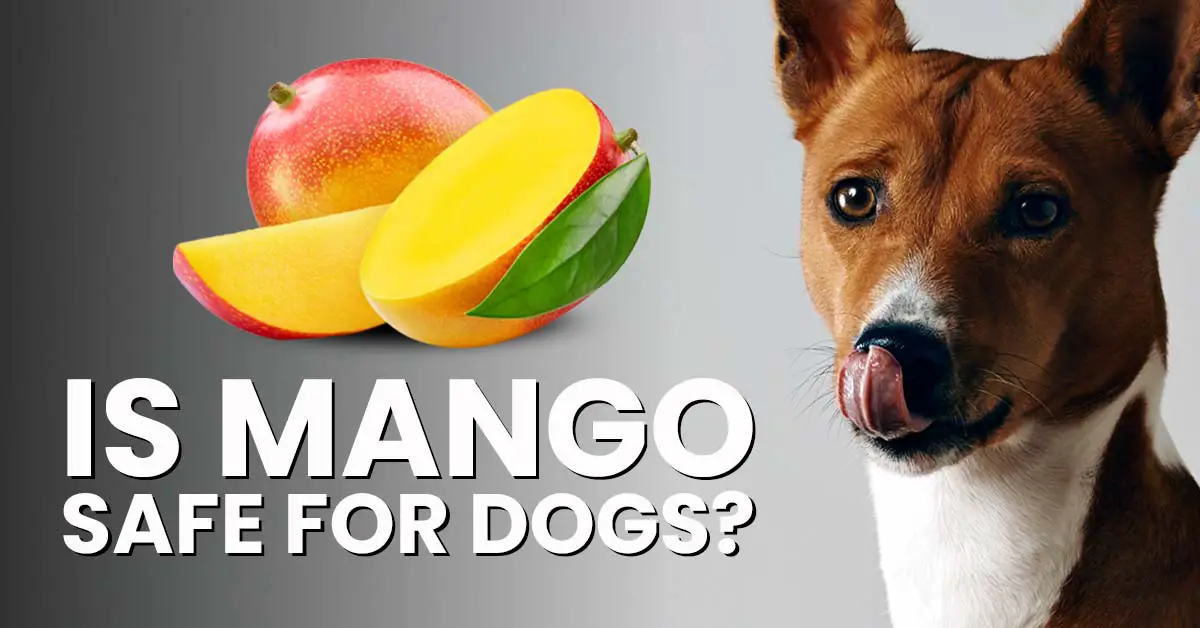Mangos are healthy, sweet, and delicious … but are they something you should feed your dog?
This juicy fruit can be a tasty treat in moderation, but it’s possible to go too far and overfeed it, which brings with it certain risks.
So … here’s everything you need to know about mango for dogs …
Is Mango Safe for Dogs?
Ever wonder: “Can dogs eat mango?” The answer is yes – dogs and puppies can eat mango safely. This sweet fruit is a healthy snack thanks to its many vitamins and minerals.
However, if you’re going to feed your dog mango make sure to peel the skin and discard the mango pit before feeding. Dogs should really only eat the flesh of the mango fruit. They can technically eat the skin, but there’s not much benefit aside from a bit of extra fiber … plus, some dogs may have difficulty digesting the skin. Mango pits are edible in theory – but they’re a choking hazard.
So while dogs can technically eat mango pits and skin, they carry the risk of more potential problems than they’re worth. So it’s best to err on the safe side and just feed your dog the flesh of the fruit (where most of the benefits are anyway … as you’’ll see later).
How Much Mango Can a Dog Eat?
Even though dogs can eat mango safely, it shouldn’t be a daily staple of your dog’s diet. The bulk of a dog’s diet should ideally come from high quality protein, healthy fats, vegetables, and other healthy foods for dogs.
So if you’re going to feed your dog mango, just make sure to do so in moderation. In general, anywhere from 2-4 pieces of mango fruit (about 1″ wide x ¼” thick) fed every once in a while is plenty for most dogs.
If you haven’t fed your dog mango before, start slowly (just 1 piece) to make sure he doesn’t have any sensitivity or digestive issues with the food.
Mango for Dogs | Risks of Overfeeding
Fed in moderation, mango can have benefits for dogs. But if you feed too much of it or do so too often, it can actually have some risks too. So even though mango is a generally healthy fruit … here’s why you still don’t want to feed too much of it to your dog, or feed it every day.
Sugar
The main risk of feeding too much mango comes from the fruit’s high carb and sugar content. This likely won’t be a problem if you only feed mango in moderation according to the guidelines above.
Too much sugar, even if it’s from a healthy source like mangoes, can cause several health issues in dogs, including:
- Obesity
- Diabetes
- Oral health problems
- Upset stomach
For dogs who are overweight or diabetic, mangoes aren’t a great choice. Mangos have a glycemic index rating of 51, which is low relative to other tropical fruits like pineapple. Still, mango has the potential to raise blood sugar especially if eaten in large servings.
Allergies And Digestive Issues
Introducing any new food to your dog carries some risk of allergies or digestive problems. Luckily, there haven’t been any documented cases of mango allergies in dogs.
Mango skin does contain a component that humans have had allergic reactions to though … it’s called urushiol, and it’s also found in poison ivy. This compound can cause skin irritation.
Choking Hazard
Mango skin can also be a choking hazard for dogs. The same goes for mango pits or seeds, which can also cause digestive blockages. Mango seeds also contain cyanide, which is toxic to dogs in lower doses than it is for humans. You can make mango a significantly less risky food for your dog by removing the pits and seeds, peeling it, and only feeding the flesh of the fruit.
Is Mango Good for Dogs? | Top 3 Benefits
As long as it’s fed in moderation, mango isn’t just safe for dogs – it has a few unique benefits. Here are three of the biggest benefits of mangos for dogs.
1. High in Important Vitamins
Mangos are a nutritious treat for dogs and humans alike because of their high vitamin content. Mangos contain antioxidants and essential vitamins A, B6, C, and E.
2. High in Fiber
Mangos are also high in fiber, which means they may help improve digestion by strengthening the gut. Fibrous foods are also filling, so adding a bit of mango to a meal can be a way to increase satiety without adding many calories.
3. High in Carotene
Lastly, mangos are high in both alpha and beta-carotene. These compounds promote eye health, lower cancer risk, and protect the body from free radicals.
FAQ
Here are some other common questions we get from pet-owners about whether mangos are safe for dogs.
Can Dogs Eat Mango Seeds?
Dogs should not eat mango seeds. In addition to being a choking hazard, mango seeds contain cyanide compounds which are poisonous to dogs.
Can Dogs Eat Dried Mango?
When dried, mangos lose a lot of their nutrition benefit, and will be even higher in sugar. So even though dogs can eat dried mango, it’s best to stick with feeding them fresh mango fruit.
Can Dogs Eat Mango Skin?
Dogs can technically eat mango skin, but it has the potential to cause stomach issues, be a choking hazard, and irritate the skin. So dogs should only eat the flesh of the mango fruit.
Can Dogs Eat Mango Yogurt?
Dogs should not have mango yogurt. Mango yogurt is likely flavored using mango juice, or artificial mango flavoring, which can be toxic for dogs. It may also contain extra sugar. We don’t recommend feeding your dog yogurt in general, because many dogs are also lactose intolerant.
